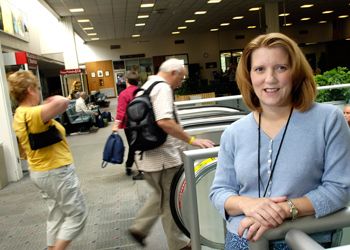Pease attempts to woo troop flights
 Photo/David A. Rodgers
Bangor International Airport Director Rebecca Hupp says she's confident that military charter airlines will continue to stop in Bangor
Photo/David A. Rodgers
Bangor International Airport Director Rebecca Hupp says she's confident that military charter airlines will continue to stop in Bangor
Bangor International Airport was in the spotlight recently when two military charter airlines that bring more than 100,000 troops through the airport every year started taking a closer look at Portsmouth’s airport as an alternative spot for refueling.
On Oct. 5, Seacoastonline. com reported that Portsmouth International Airport at the former Pease Air Force Base had brokered “agreements” with two troop-carrying charter airlines — Tulsa, Okla.-based Omni Air and Atlanta, Ga.-based World Air — to use its airport for transit services, such as refueling. But BIA has managed to convince at least one of the carriers to stay.
Portsmouth, in an attempt to increase its deplanements to be eligible for more federal dollars, waived its service fees to attract the airlines. Waiving fees could save the airlines close to a $1,000 a flight, according to the online newspaper. “While we’re not surprised because Portsmouth has always been very aggressive in meeting with our customers and trying to lure them to Pease, we were surprised by the offer of free services and free landings,” Rebecca Hupp, director at BIA, said at the time. “And so certainly we recognize in this economic climate that that can be attractive to our customers.”
The news caused a stir in Bangor, where the airport has played host to those two military charter airlines for six years, almost since the wars in the Middle East began. According to Hupp, Omni and World were only using Portsmouth on a trial basis, and continue to use Bangor. A third carrier, North America Airlines, still uses Bangor.
The three airlines have brought nearly 1 million troops through the airport, many of whom were welcomed by Bangor’s now-famous troop greeters, an activity recently made into a documentary film, “The Way We Get By,” that was screened on Capitol Hill in Washington, D.C., earlier this month and may be making a run for an Oscar.
Tug of war
The news irritated an already sore spot in the Bangor community. In August, Continental Airlines said it would pull its service from BIA, and Delta Air Lines, the airport’s biggest carrier, said it would end flights between Bangor and Boston’s Logan International Airport on Dec. 1.
Through July, the airport had six consecutive months of increasing passenger traffic and attracted some low-cost carriers such as Allegiant Air, which flies to Sanford, Fla., near Orlando. That airline is increasing flights from Bangor and Hupp told the Bangor Daily News in September that BIA is trying to recruit an airline to provide nonstop service to Washington, D.C.
Three days after that initial report about Pease was released, Omni Air abruptly ended its relationship with Portsmouth. That was welcome news to Hupp, who says the airport had lost two or three flights due to Omni’s trial run at Portsmouth. “Omni’s decision to continue transiting Bangor is good news for the airport and the Bangor region,” Hupp says. “We thought Pease’s announcement and statement were premature. But the airline industry is very fluid and we’re pleased to see that our reputation and long-standing relationship with Omni persevered despite Pease’s very shortsighted attempts to lure this business by offering services for free.”
Hupp initially declined to comment on why Omni made its decision, but when pressed said, “I think they recognized that despite Pease’s offer of short-term benefits, in the long term Bangor offers better service, and therefore better value.”
Portsmouth International Airport has always been aggressive in trying to lure customers from BIA, says Hupp. A couple of years ago, it successfully enticed Miami Air, another small troop carrier, away from Bangor, she says.
Hupp received flak from critics for not lowering BIA’s fees to compete with Portsmouth’s aggressive stance, but Hupp says BIA was in no position to offer similar terms. Airports like Portsmouth and Bangor are subject to Federal Aviation Administration rules that say each airline must be treated the same, she says. Since Portsmouth has no other airlines, except the small carrier Miami Air, it can waive its fees for Omni and World without far-reaching impacts; Bangor would need to waive its fees for all airlines if it made a similar offer. “We’re not going to try and compete and match free,” Hupp says. “We obviously are doing everything in our abilities so that our customers are satisfied with Bangor.”
Hupp says she was confident Omni would stay with BIA and expects World will do the same. “In the long term, we’re confident that the customers will continue to use Bangor because of its superior infrastructure, equipment, capability to handle multiple operations and our experience serving these customers,” she says.
Losing the flights to Portsmouth International Airport would be more of a morale blow than financial, Hupp says. The military transit flights are a “complementary business” and have never been part of the airport’s long-term business strategy, she says. “We are not going to count on the war continuing indefinitely and count on them continuing to operate equipment that needs to stop for fuel,” Hupp says. “So the flights are certainly important and have generated revenue for the airport and region, but in terms of long-term business strategy, the airport needs to sustain itself beyond military flights.”









Comments